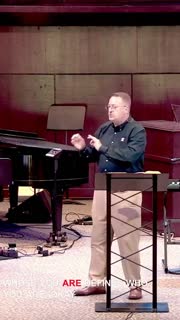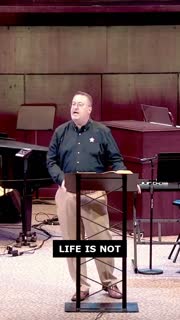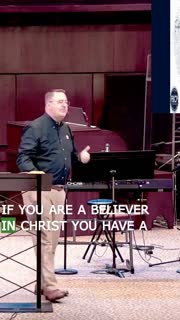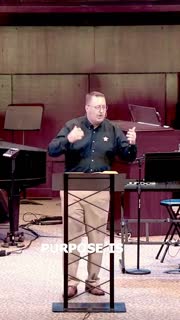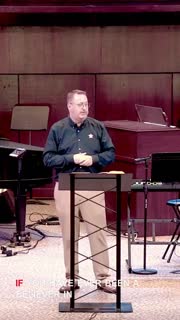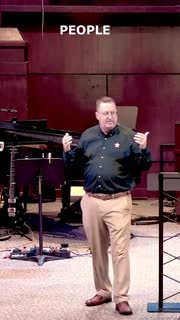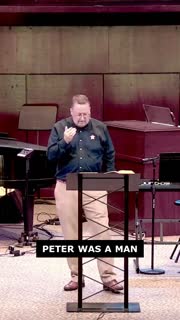Finding Our True Identity in Christ
Devotional
Sermon Summary
Bible Study Guide
Sermon Clips
1. "Peter found his identity not in what he did, not in the failures that he made, not in the successes that he had, but he found his identity in his walk with Christ. That's where Peter was identified. He was first and foremost a child of God, a disciple of Jesus. That was the first and foremost thing that Peter was from that point when he followed Jesus. From that point forward, that's who he was." [34:51] (26 seconds)
2. "Knowing whose you are defines who you are. If my primary focus in this world is to gather as much money as I can, provide for my financial security, or if my desire is to make sure that I enjoy this life as much as I can and pile up all the things that I love to do focusing on what God would have me to do, then that determines who I am. But if I have placed my faith and trust in Christ, then knowing whose I am, if I am His kid, if I am His child, if I am His servant, if I am His beloved, then that determines who I am." [52:36] (70 seconds)
3. "Knowing who you are fuels what you do. If my focus is piling up all those goods, then that's going to determine what I do. That's going to order my events of my day and my life and my week. If I am a child of God, then that is going to fuel how I think about things. That is going to fuel my schedule. That is going to fuel my heart's desires. That's going to fuel how I lead my family. It's going to fuel how I vote. It's going to fuel how I intermingle with people in society. It's going to affect how I lead out in relationships of all kinds." [55:10] (39 seconds)
4. "Jesus' hand on your life is not subject to whether you are a good person. Jesus' hand on your life is not subject to whether, you know, you have been 100% faithful today. Jesus' hand on your life is based upon the fact of, do you have a relationship with him? Because we all know that we love people that are going to fail us from time to time, and we continue to love them. And Jesus has that kind of love, and even more so for people like Peter." [33:47] (29 seconds)
5. "If you are a believer in Christ, you have a relationship with him, if you are a Christian, your ultimate citizenship is out of this world. It's in heaven. We are aliens here, temporary residents of earth. And one day we will be with him in heaven. So he's identifying them as these aliens. So we need to understand that we are living temporarily in this world. It seems like forever because it's the only life that we know. But we're going to spend a lot more time somewhere else than we are here. Forever is a long time." [43:58] (35 seconds)
6. "If we are in Christ, we can trust that the Lord has a plan for us today and all the tomorrows that are to come. Another thing that helps identify these believers that we can also identify with is their sanctification. What does sanctification mean? It's a purifying. It's really, when he comes down to it, it's growth in Christ. You know, once we meet Jesus, whatever age you were, the growth that you, as you mature in Christ, as you grow, that is that sanctification process." [45:37] (37 seconds)
7. "Our purpose is obedience to Christ. Ephesians 2.10 says, we were created for good works, which he will empower us to do. We don't have to work for finding the works. He will lay those upon us. He will give us those burdens for those things. He will direct our heart and our mind. We just develop that relationship with him and he will put those things in our path. He will put those desires in our path. He will put those desires in our path. He will put those desires in our path." [47:10] (25 seconds)
8. "If you have ever been a believer in Christ, he is never letting you go. We can trust in that. So we can identify with these people that Peter is speaking with in their security. And then finally, we can identify with them, and they are identified by their advantages. The last statement is so powerful. This is part of Peter's greeting, but this really overarches everything else. May grace and peace be multiplied to you." [50:06] (30 seconds)
9. "People in this life in 2024 seem to have a need for grace and peace more than ever before, at least in my lifetime. A lot of people are battling with mental, uh, illness battling with family crises. We're scarred from things that have happened in our past. We're in situations now that we feel stuck in. We don't know how we're going to make it financially. And I'm here to tell you that start with knowing whose you are, and he will begin to develop who you are, and then he'll guide you through all of those things." [01:01:14] (60 seconds)
10. "Peter was a man that was one of Jesus' chosen instruments. He was used by Jesus to be very important in starting the early New Testament church. But I've already described to you two instances where Peter had really strong failures. So there was times when Peter's faith may have been tested a little bit, and he may have failed a couple of tests. But make sure and know this, that regardless of what Peter did, Jesus never took his hand off Peter." [33:47] (36 seconds)
Ask a question about this sermon
2. "Knowing whose you are defines who you are. If my primary focus in this world is to gather as much money as I can, provide for my financial security, or if my desire is to make sure that I enjoy this life as much as I can and pile up all the things that I love to do focusing on what God would have me to do, then that determines who I am. But if I have placed my faith and trust in Christ, then knowing whose I am, if I am His kid, if I am His child, if I am His servant, if I am His beloved, then that determines who I am." [52:36] (70 seconds)
3. "Knowing who you are fuels what you do. If my focus is piling up all those goods, then that's going to determine what I do. That's going to order my events of my day and my life and my week. If I am a child of God, then that is going to fuel how I think about things. That is going to fuel my schedule. That is going to fuel my heart's desires. That's going to fuel how I lead my family. It's going to fuel how I vote. It's going to fuel how I intermingle with people in society. It's going to affect how I lead out in relationships of all kinds." [55:10] (39 seconds)
4. "Jesus' hand on your life is not subject to whether you are a good person. Jesus' hand on your life is not subject to whether, you know, you have been 100% faithful today. Jesus' hand on your life is based upon the fact of, do you have a relationship with him? Because we all know that we love people that are going to fail us from time to time, and we continue to love them. And Jesus has that kind of love, and even more so for people like Peter." [33:47] (29 seconds)
5. "If you are a believer in Christ, you have a relationship with him, if you are a Christian, your ultimate citizenship is out of this world. It's in heaven. We are aliens here, temporary residents of earth. And one day we will be with him in heaven. So he's identifying them as these aliens. So we need to understand that we are living temporarily in this world. It seems like forever because it's the only life that we know. But we're going to spend a lot more time somewhere else than we are here. Forever is a long time." [43:58] (35 seconds)
6. "If we are in Christ, we can trust that the Lord has a plan for us today and all the tomorrows that are to come. Another thing that helps identify these believers that we can also identify with is their sanctification. What does sanctification mean? It's a purifying. It's really, when he comes down to it, it's growth in Christ. You know, once we meet Jesus, whatever age you were, the growth that you, as you mature in Christ, as you grow, that is that sanctification process." [45:37] (37 seconds)
7. "Our purpose is obedience to Christ. Ephesians 2.10 says, we were created for good works, which he will empower us to do. We don't have to work for finding the works. He will lay those upon us. He will give us those burdens for those things. He will direct our heart and our mind. We just develop that relationship with him and he will put those things in our path. He will put those desires in our path. He will put those desires in our path. He will put those desires in our path." [47:10] (25 seconds)
8. "If you have ever been a believer in Christ, he is never letting you go. We can trust in that. So we can identify with these people that Peter is speaking with in their security. And then finally, we can identify with them, and they are identified by their advantages. The last statement is so powerful. This is part of Peter's greeting, but this really overarches everything else. May grace and peace be multiplied to you." [50:06] (30 seconds)
9. "People in this life in 2024 seem to have a need for grace and peace more than ever before, at least in my lifetime. A lot of people are battling with mental, uh, illness battling with family crises. We're scarred from things that have happened in our past. We're in situations now that we feel stuck in. We don't know how we're going to make it financially. And I'm here to tell you that start with knowing whose you are, and he will begin to develop who you are, and then he'll guide you through all of those things." [01:01:14] (60 seconds)
10. "Peter was a man that was one of Jesus' chosen instruments. He was used by Jesus to be very important in starting the early New Testament church. But I've already described to you two instances where Peter had really strong failures. So there was times when Peter's faith may have been tested a little bit, and he may have failed a couple of tests. But make sure and know this, that regardless of what Peter did, Jesus never took his hand off Peter." [33:47] (36 seconds)

